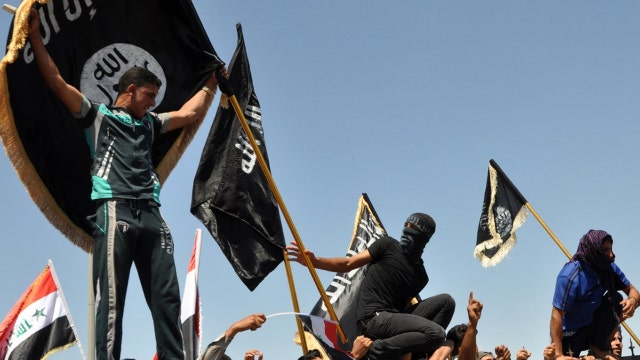Damning admission of ISIS strategy from Centcom commander
Admits size of US-trained Syrian fighting force is '4 or 5'; national security correspondent Jennifer Griffin reports from the Pentagon
The top U.S. military commander for the Middle East admitted Wednesday that only "four or five" U.S.-trained fighters remain on the battlefield in Syria, leading to accusations from lawmakers that the program is a "joke" and "total failure."
Gen. Lloyd Austin, commander of the U.S. Central Command, addressed the state of the so-called "train and equip" mission in testimony before the Senate Armed Services Committee.
The original goal for the first year was to train roughly 5,400 fighters to take on the Islamic State. But the first group of 54 U.S.-trained fighters was attacked by a Syrian affiliate of Al Qaeda, which killed and captured several of them and sent others fleeing.
For the first time Wednesday, the U.S. military acknowledged hardly any remain.
"It's a small number. The ones that are in the fight ... we're talking four or five," Austin told lawmakers, admitting the military will not reach its training goal this year.
The admission inflamed criticism that's been simmering for months.
While more Syrians are in training, Sen. Claire McCaskill, D-Mo., suggested it may be time for a new plan. And she challenged the Pentagon's request for $600 million for more training next year.
"We're counting on our fingers and toes at this point," she said of the trained fighters.
Sen. Kelly Ayotte, R-N.H., suggested the Pentagon shift to supporting other countries operating in the region like Turkey.
"This four or five U.S.-trained fighters -- let's not kid ourselves, that's a joke," she said.
The witnesses acknowledged the shortcomings with the program but suggested it is salvageable.
"They will figure out a way to get the job done one way or the other," Austin said of U.S. trainers.
Christine Wormuth, under secretary of defense for policy, said the mission is part of a "broader effort" and those getting training can be "force multipliers" for other groups on the ground.
Sen. Jeff Sessions, R-Ala., though, said: "We have to acknowledge this was a total failure. ... I wish it weren't so, but that's a fact."
The congressional criticism of the training mission made up just part of the severe concerns lawmakers voiced about the state of the anti-ISIS fight. They grilled Austin and Wormuth about the growing refugee crisis in Europe stoked by unrest in Syria; the Russian military build-up in Syria in support of the Assad regime; and allegations that intelligence on ISIS and other militant groups in Syria was manipulated to exaggerate progress being made against them.
On the latter charge, Austin vowed Wednesday to take "appropriate action" if an investigation indicates that senior defense officials altered intelligence reports.
A Defense Department inspector general began an investigation into the matter after an intelligence officer at the Central Command lodged a complaint in July. In his first remarks about the allegations, Austin said he welcomed the inspector general's investigation, but that he could not comment directly until the review was over.
Committee members expressed concern.
"Published media reports suggest that the CIA's estimate of ISIL's manpower has remained constant, despite U.S. airstrikes -- which suggests that either they were wrong to begin with, or that ISIL is replacing its losses in real time. Neither is good," said committee Chairman Sen. John McCain, R-Ariz.
"Indeed, this committee is disturbed by recent whistleblower allegations that officials at Central Command skewed intelligence assessments to paint an overly-positive picture of conditions on the ground," McCain said.
The Daily Beast reported several dozen intelligence analysts at Central Command, which oversees the war effort, have formally complained that their reports on ISIS and Al Qaeda's branch in Syria were being inappropriately altered by senior officials.
McCain had some of the toughest criticism for Wormuth and Austin, who claimed the Islamic State's future is "dim."
"I have never seen a hearing that is more divorced from reality by outside experts," McCain said, calling the anti-ISIS effort an "abject failure."
The Associated Press contributed to this report.





